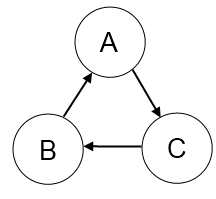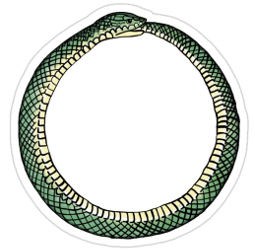Circular Reasoning - Definition and Examples
Contents
Definition
Circular Reasoning also called circular logic or circulus in probando is an informal logical fallacy meaning arguer uses the same reason as the conclusion. Here is Circular Reasoning example with just rewording same statement.
Everyone must obey the law, because it’s illegal to break it.
Sometimes it forms longer chain: “A is true because B is true; B is true because A is true.” And if chain of propositions longer than that the circularity will be difficult to recognise.

It is a defect in argument where even if the premises are true and conclusion will be true, so this reasoning is logically valid, the premises still require the proof of evidence in their own turn, and as a consequence the circular argument fails to persuade. Another way to put it - the premises provide no independent ground or evidence for the conclusion, and no reason to accept the premises unless one already believes the conclusion.
This fallacy is included into the group of Improper Premise or Question-begging fallacies where other members are Begging the Question, Loaded Language, Loaded question and No true Scotsman.
Begging the Question is the type of circular reasoning where the premises assume the truth of the conclusion, instead of supporting it but in modern day-to-day language it just suggests to provide the evidence for the premises first.
Tautology
Repeating the statement in the same or synonymous phrases effectively “saying the same thing twice”. See also pleonasm.
Boys will be Boys!
Logical Tautology is a single proposition, not a conclusion, though it sometimes looks like simplest case of circular reasoning. Tautology logical example would be: A implies A. For simplest circular reasoning similar example would be A, therefore A.
I’m a fighter, and fighters fight!
Circular Definition
A circular definition is one that uses the term(s) being defined as a part of the definition or assumes a prior understanding of the term being defined.

Example can be found in the 2007 Merriam-Webster dictionary where hill is defined:
hill - “1: a usually rounded natural elevation of land lower than a mountain”
and a mountain in its turn:
mountain - “1a: a landmass that projects conspicuously above its surroundings and is higher than a hill”
Circular Reference
A circular reference is a chain of references where the last object references the first, resulting in a closed loop. Circular reference is not a Circular Reasoning fallacy, it’s just a result of using circular definition. Dictionaries must always ultimately be a circular reference since all words in a them are defined in terms of other words from the same dictionary.
Circular reporting
False confirmation (citogenesis) is a situation where a piece of information appears to come from multiple independent sources but in reality comes from only one source. The problem often happens through sloppy intelligence-gathering practices or information flow can be intentionally manipulated by the original source so information is assumed widely-beleived. For instance, spreading rumors.
Circular reporting occured in journalism, where newspapers cited wikipedia and wikipedia did the same to newspapers on the same topic, in scholary research and even in military inteligence gathering (the case of the 2002 Niger uranium forgeries).
Self - referencing
Self-referencing is form of sentence when an idea refers to itself. Self-reference is studied, occurs or used in philosophy, linguistics, mathematics and other sciences.

Self-referential statements are sometimes paradoxical. For example, in classical philosophy, paradoxes were created by self-referential circular logic such as the omnipotence paradox of asking:
If it was possible for a being to exist so powerful that it could create a stone that it could not lift?
Also see The Epimenides paradox, also called Liar paradox which is thought to took origins from the statement of the Cretan prophet Epimenides (6th century BCE) that:
All Cretans are liars
As Epimenides was himself a Cretan, the statement is recursively false. If Cretans are liars, he can not write truthful sentence, and if they are not, then sentence lies.
Other common logical fallacies:
More info: